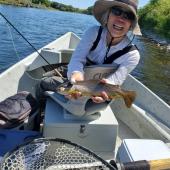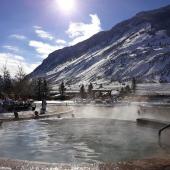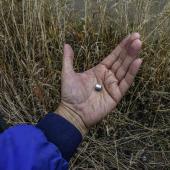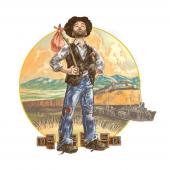ABC Acres
Taking Agricultural Restoration to a New Level

The lead to the Missoulian newspaper article is what caught my eye: “Lessons to be learned: ABC Acres hoping to become a center of new-age agriculture in the Bitterroot Valley.” While Dunrovin is a guest ranch focused almost exclusively on horses, we do face many agricultural challenges supporting our equine herd with sufficient and nutritious pastures and managing our orchard and large garden. For years we’ve struggled with balancing our desire to protect humans, horses, and wildlife by avoiding herbicides, pesticides, and fertilizers with our desire to maximize the productivity of our land. There’s a lot to learn and we’ve heard a lot of conflicting ideas about how to achieve our goals. With that in mind, I thought “ what the heck”, I’ll just call up ABC Acres to see if I can come for a tour.

ABC Acres’ owners Tim and Sarah Southwell could not have been more welcoming. Tall and lanky with a big stride and grin, Tim walked towards me as I drove down the driveway. From our first meeting, I recognized him as a man of passion with a burning desire to harness nature’s energy and resilience to improve the ways we manage our lands, feed ourselves, and connect as families and communities. Together with farm manager, Grant Shadden, Tim spent the next several hours guiding me through their beautiful farmstead along the Bitterroot River, surrounded by the Sapphire and Bitterroot Mountains.

I had never heard the term “permaculture” before. But I soon learned that ABC Acres takes the traditional definition of sustainable and self-sufficient agricultural ecosystems to an entirely new level. The Southwells are interested in using nature’s regenerative properties to revitalize lands that had been despoiled by previous land use practices or disturbances. They see ABC Acres as an experimental farm where they can develop new methods of increasing soil health and achieving greater productivity of chemical-free and humanely raised livestock in a financially sustainable manner.

It’s a tall order, and they are making tremendous progress.
A critical part of their mission is education. They experiment not only for themselves, but to share with others and help create community centered around healthy living. To that end, they have initiated several programs. Lovely Farm Stay guest houses with a whimsical children’s treehouse offer visitors opportunities to relax and enjoy western Montana’s many recreational opportunities as well as participate in farmstead activities to learn firsthand how to employ nature’s powers to improve their own backyards. Self-guided farm tours with informational kiosks showcasing the concepts underlying various natural installations invite overnight and day visitors to wander the property and learn about the natural processes at play. Public events and workshops along with organizing the Bitterroot Valley Permaculture Group have gotten local residents engaged, exchanging ideas, and supporting one another.

ABS’c Crater Garden routinely elicits the most “oohs” and “aahs” from visitors. ABC Acres’ farmland includes an old, water-filled borrow pit (an area where material such as gravel or sand had been dug for use elsewhere). Rather than viewing it as a problem, the Southwells saw it as an opportunity. Inspired by Austrian permaculture virtuoso Sepp Holzer, they harnessed the temperature-moderating influence of the water’s mass and sunlight reflection, together with the pit’s steep slopes to form a microclimate. They contoured terraces for vegetation, deliberately arranging plants to form windbreaks and further concentrate heat to support plants not normally found in Montana, such as peach trees.





Like many Montana farms, wintering elk herds take up residence on their valley floor land. Elk are large and have a well-deserved reputation for destroying fences, causing ranchers constant fence maintenance. The Southwells have addressed this problem by planting a mixture of shrubs, including chokecherry, black locust, four varieties of hawthorn and Siberian peas, that will ultimately grow into an impenetrable hedge. The prickly hedge has several advantages over traditional fencing. Once grown, it will be permanent, need little annual maintenance, and also serve as a windbreak, reducing the amount of evaporation from irrigation, and thus the amount of water and energy needed to sustain grass production. It’s a win/win solution all the way around.
Livestock on the farm include cattle, pigs, goats, turkeys, and chickens, all of which are free ranging and live in conditions natural to them. The Southwells employ “mob grazing” techniques to move their highland cattle between pastures in a rotation system that nourishes the cattle, the soil, and the grass. The cattle completely graze one pasture before being moved to the next. The mobile chicken coop follows on the heels of the cattle so chickens can scratch, spread the cattle manure, and aerate the top soil layer while adding their own fertilizing manure. After the chickens depart, the pasture is rested and irrigated to stimulate grass production. This never ending loop — graze, recover with the chickens, rest with water, to be grazed again when ready — is not only sustainable but regenerative.
My head was swirling with ideas as I left ABC Areas to drive home. What changes could I make at Dunrovin to utilize plants and nature to solve some of our own problems. The Southwells had successfully infected me with their visions.
A vexing problem that I had been cogitating for some time was shade for the horse stalls along the southern side of our paddock. I do not want to construct a shed, as horses are healthiest when kept outside with fresh, moving air. I had already considered planting trees, but they can take forever to reach shade height. Eureka! I could build a special fence to grow hops. Hops grow fast and thick. A little research revealed that hops are not only safe for horses but actually have medicinal qualities for both humans and horses. Hops would provide shade only in the summer, so winter ice formation in the paddock will not a problem. Plus I can harvest the hops to take to the local brewery to turn into beer. Perfect, hops for horses! Stay tuned as my hops for horses fence becomes a reality and we are toasting its success with our new Dunrovin Brew. What a great solution that does everything the Southwells envisioned.
Dunrovin is grateful for having made that cold call to request a tour. We treasure our continuing relationship with ABC Acres. We have much to learn together. And you too can come to the ABC Acres to be a part of it all. Give them a call. They are sure to welcome you as warmly as they welcomed me.
ABC ACRES - CONTACT INFORMATION

Phone: (406) 210-5710
Website: http://abcacres.com/
Physical Address:
364 S. McCarthy Loop
Hamilton, MT 59840
Mailing Address:
1075 Sleeping Child Rd.
Hamilton, MT 59840
⬅ VIDEO: ABC acres: Management Practices for Productive Tree Systems - episode #034
VIDEO DESCRIPTION: Join ABC acres, a Permaculture Farmstead in Hamilton, MT as we show chop and drop mulching and pruning, which are a couple key management practices for increasing the health and production of our agroforestry tree systems.












Leave a Comment Here